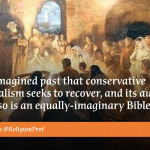Religious freedom – it seems like such a simple concept and such a lofty ideal. Yet we can still find ourselves getting muddled in all sorts of grey areas, or at least areas that raise important additional issues, even if those pertaining strictly to religious freedom are ultimately clear cut.
There is something fundamentally different between the free speech of a minority group and the free speech of a group that is in the majority, particularly if it is an overwhelming majority. Is it really the same thing if someone from the U.S. goes to Nepal and calls upon people to believe in Jesus, and if a group of Americans in a town in the U.S. gather around the only Nepali there and call on him or her to convert? Although in examples from colonial era India, the connection between state power and the Christian message was much closer, in the U.S. there can still be similar situations involving peer pressure, if not government influence. This is particularly true in cases involving youth, who already feel great pressure to conform and fit in.
I would expect any person who is a genuine religious believer to agree that conversion motivated by peer pressure is unlikely to lead to a genuinely personal faith, and is thus something that I would expect the faithful themselves to avoid. Yet in so many instances it seems that the right to practice one’s own religious tradition as a member of a minority group might seem to be in tension with the freedom of the majority to share their own faith with such an individual, with all the pressures that may entail. (As an aside, I remember vividly my own inconsistency on religious freedom in my fundamentalist days. If someone refused to make room for my own conservative Evangelical perspective I would cry “intolerance”, and yet I also complained if I saw a bookstore carrying copies of the Satanic Bible or other literature I viewed as abhorrent).
It is in this context that I find myself wondering who in fact should be sharing their faith, not merely in the sense of talking about one’s own beliefs with those one considers friends, but engaging in activities such as public preaching. I remember vividly hearing a paper at a Society of Biblical Literature conference at which the presented noted that Paul in his letters nowhere calls upon ordinary Christians to evangelize. I was, I am quite certain, not alone in reacting first by feeling that this cannot be true, and then feeling foolish in never having noticed this! I, for one, often felt that every person ought to be able to talk about their faith, and that the inability to do so (or to do so clearly and effectively) represented a failure of the churches to adequately teach and train people. I now find myself viewing things slightly differently, in the sense that I understand why Paul might not have called upon Christians generally to actively share their faith.
Understanding the Bible, in Protestant tradition, is something that everyone is supposed to be able to do. Yet a major problem that has given rise to or at least contributed to fundamentalism in our time is this emphasis, coupled with Bible translations that give the impression that everything is clear cut. Textual and interpretative difficulties are mentioned in footnotes, but most readers of the Bible find it possible to ignore those. The impression that many Christian believers have (and many preachers and popular books help perpetuate) is that all one has to do is read the Bible and then go out and tell other people to believe and practice what it says. Add to this the dilution of the Bible’s teaching to “four spiritual laws” or “four things God wants you to know” as printed on tracts, and it becomes something that everyone can share.
Yet the problem is that the Bible consistently depicts public proclamation of the Christian message as something that is done by Jesus himself and by a relatively small number of his followers who have been trained by him or who have a significant education in the Scriptures. Such individuals are depicted in the Bible as approaching evangelism in a very different way than many people today. For those for whom what is crucial is that one mention sin and the cross as means of salvation, many instances of Christian proclamation in the Bible seem to be inadequate. Paul is depicted in Acts 17 as addressing the Athenians, and there he begins by talking about or interacting with Greek philosophers and poets, and only briefly hints at matters to do with Jesus at the very end. This acknowledges both that the main points of the Christian message cannot be understood unless one deals with matters of presupposition first, but also suggests (to me at any rate) that this Christian message and its proclamation is viewed as too important a matter to be hurried, to be squeezed into a sound bite.
Am I suggesting that sharing the Christian message be left to experts? Not really. But I do think that it is important that on the one hand Christians be better educated than they often are on matters to do with the Bible. By this I mean not simply reading the Bible, but reading serious popular but nonetheless academic and scholarly books on matters related to the Bible. The truth is, this collection of ancient writings requires study in order to understand it. One doesn’t necessarily need to learn the original languages, but one has at the very least to be aware that this is ancient literature, foreign language literature, and that reading it in translation depends on all sorts of scholarship that has made this possible. Then there is all the necessary background and cultural information, perspectives from archaeology, and other matters. If one hasn’t informed oneself by using serious, credible sources then one simply cannot claim to “understand the Bible”. If Christians who have never studied would humbly bow out of debates about what the Bible means, if Christians who are not biologists would step aside rather than engage poorly in debates about evolution, it would do everyone a favor. Instead of claiming to know what the Bible is when one has never even seen an ancient manuscript or a critical edition in the original languages, instead of claiming to know what the Bible teaches in all its detail when one has done little more than memorize proof texts, one should talk about what one does know, the experience of spiritual transformation, of community, and so on. In the Bible, debates about the Bible are not something most people do, because in those days most people couldn’t even read the Bible. While I think that improved literacy and the resulting increased access to the Bible are good things, back then the majority of Christians were aware that they were dependent on a literate minority for questions about texts and their interpretation. Increased literacy appears to have actually misled people into thinking that they know more than they do, and the result, rather than being improved spirituality, often ends up being arrogance, and claims to certainty where these are not necessarily justified.
I know a professor (who teaches another subject, and not religion) who told his students bluntly that there is no point in having a discussion, because they don’t know anything yet. It is so tempting to say the same thing to students of the Bible: so many Christians have never studied the Bible in a serious academic way, only know about Biblical archaeology the inaccurate and at times downright false claims they find on the web sites of con artists, and in other ways simply don’t have the necessary knowledge to engage in a serious intellectual discussion about the Bible or its interpretation. But here the problem is not simply lack of knowledge, but also misinformation, and while learning is difficult, unlearning what one has learned is harder still. Working through these issues is only possible dialogically – unless one works through these matters beginning where religious believers are, they will not learn and have their vision of God and of the Bible expanded in the process. They will instead perceive the new information as either irrelevant or as a threat, and resist or ignore it. And unlike in other fields, many students bring to a class on the Bible some knowledge and at least a vague familiarity with the stories, even if it is often a highly simplistic and over-simplified impression, and this can make a positive contribution to learning. So I do believe that one can begin from there and work inductively, and learn through discussion.
On the other hand, there is a preponderance of misinformation and ill-informed perspectives in churches that is in danger of turning those Christian traditions into a collection of urban legends. The printing press revolutionized the church in many positive ways by bringing the Bible into the language and hands of the many rather than the few. I suppose the question is how we get an understanding of the Bible and Biblical scholarship into those same hands. There is a serious danger that unless this can be accomplished there will be a divide between a minority of well-informed Christians who can speak of what they know, and a larger majority that will continue to perpetuate poor impressions of Christianity as they speak of that which they do not know. The possibility for bringing about this sort of change is possible as never before. The biggest hinderance is not the ability of people to learn, but their willingness. Most Christians, like most people generally, will remain content with what they think they know and will resist anything that challenges their comfort zone. Yet with respect to so many things, Christians already know that if they are open to hearing God’s voice it will inevitably take them outside their comfort zones. Why should knowledge of and understanding of the Bible be any different?













